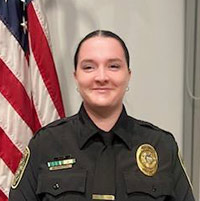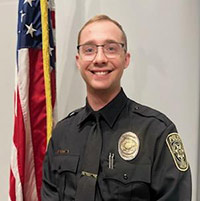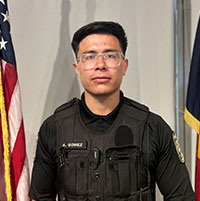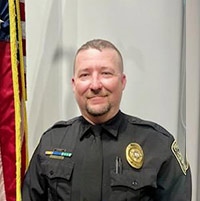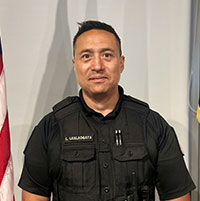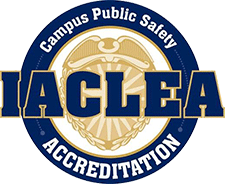Office of Campus Safety
The primary role of the Office of Campus Safety is to promote a safe environment to enhance the educational experience of our students and provide assistance and protection to all on our campuses.
Office of Campus Safety
Providing a safe living and learning environment for our students

Chief
Payne
email
Welcome to the Yavapai College Campus Safety Department
We have the same responsibilities and authority as municipal, county or state police agencies. We work to promote safety and responsibility through education and awareness, training and interactive networking, and when necessary, enforcement of the law.
The YCCS team carries out their duties in a manner that reflects the Community Policing Philosophy and Outward Mindset.
The primary role of the YCCS is to promote a safe environment to enhance the educational experience of our students and provide assistance and protection to all on our campuses.
Safeguarding personal and college district property is also a role of the police department. The YCCS takes pride in providing a high level of customer service. We believe it is a privilege to provide public safety service to the visitors and students, faculty and staff, and the entire campus community.
YCCS is always interested in your thoughts and input about the safety of our campuses. Whether in Prescott, Clarkdale, Sedona, Chino Valley or Prescott Valley, please don’t hesitate to contact the campus safety department with your compliments, concerns or complaints.
You may also contact me directly. I can be reached at: tyran.payne@yc.edu or by phone at: (928) 771-6132.
Sincerely,
Tyran Payne
Chief of Police, Yavapai College
Dispatch (PRCC) – The Prescott Regional Public Safety Communication Center is the emergency answering point for four police agencies and four fire department agencies:
- Prescott
- Prescott Valley
- Yavapai College
- Yavapai-Prescott Indian Tribe)
The regional center concept has the advantage of real time communications between partnering agencies. The Communication Center is a 24 hour operation staffed by 30 civilian employees who are cross trained to handle Police, Fire and EMS emergency calls.
Yavapai College Campus Safety utilizes bicycle patrols to respond quickly and efficiently to the needs of the Campus Community.
Bike patrol allows officers to interact closely with everyone and is faster on campus than patrol cars due to the large amount of foot and vehicle traffic. Bike Officers attend an intense forty-hour school to become certified to patrol on bicycles, and more than half of the Campus Safety Police Officers are bike patrol certified.
Officer Training
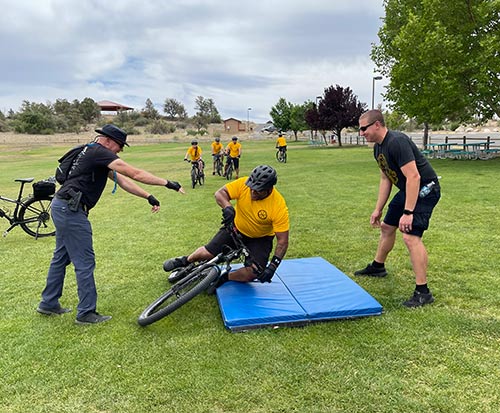
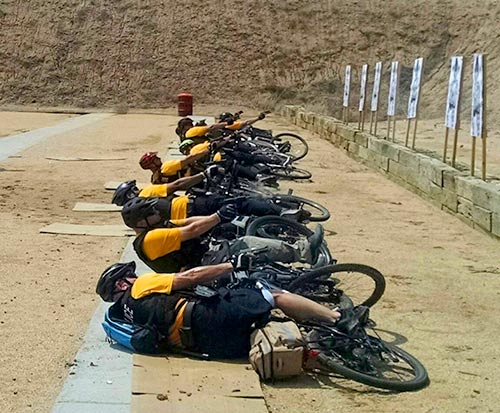
We are able to provide a variety of trainings to the YC community, such as:
ALERRT/AAIR
AAIR - The Active Attack Integrated Response Train-the-Trainer Course (AAIR) is a performance level course designed to improve integration between law enforcement, fire, tele-communicator and emergency medical services (EMS) in active attack / shooter events. Provided by instructor Felton.
ALICE – Active Shooter Response Training (Alert, Lockdown, Inform, Counter, Evacuate) empowers your people to make good survival decisions should an attack occur. Provided by instructors Munday and Felton.
CRASE – The Civilian Response to Active Shooter Events (CRASE) course, designed and built on the Avoid, Deny, Defend (ADD) strategy developed by ALERRT in 2004, provides strategies, guidance and a proven plan for surviving an active shooter event. Provided by instructors Payne, Munday, and Felton.
De-Escalation Training: The Surviving Verbal Conflict®
This course develops and prepares professionals to survive verbal conflict and strengthens de-escalation skills. Taught by instructor Oscar Berrelez.
Rape Aggression Defense (R.A.D.) Training
The Rape Aggression Defense System (R.A.D.) is a program of realistic, self-defense tactics and techniques. The R.A.D. System is a comprehensive course for women that begins with awareness, prevention, risk reduction and avoidance, while progressing on to the basics of hands-on defense training. Provided by instructors Thomasson and Felton.
Forms .pdf
ALERTYC: alertYC is an emergency text message / email notification system used to provide information and instructions to students, faculty, and staff in the event of an incident or emergency on-campus, including campus closures or late starts/early releases.
Lost and Found: The College Police Department is designated as the location for receiving and storing found property. If you have found property, please bring it to College Police. If you have lost property, we may have it. Contact us at (928) 776-2185 or in person.
Weapons Policy & Storage: Visitors to campus must check their firearms in to building 28 when entering campus property. The weapons will be stored for the duration of the visit and will be checked-out of storage when the visitor is leaving campus. For more information, call 928-776-2185.
Safety Escorts:Your safety is our number one priority. The Yavapai College Police Department will provide a safety escort for any YC student, staff, faculty or visitor who is concerned about their safety by walking with you or providing you a ride, we will get you from one location to another safely.
CARE Team
The Care team at Yavapai College investigates, communicates, evaluates, and responds to reports of risk related to individual student(s) and campus safety. The Care (Campus, assessment, response, evaluation) team meets regularly to act in a proactive manner to confidentiality and discreetly assist students in connecting with resources, and to recommend interventions or actions as appropriate.
The Care team process does not replace faculty classroom management, disciplinary processes, and/or public safety responses to incidents.
Student Services
Yavapai College offers personal and academic support in and outside of the classroom and campus.
View the Student Services page
Internship Program
The mission of the Yavapai College Campus Safety Internship program is to provide an educational and meaningful experience for our selected interns to develop an understanding of the law enforcement profession, with a special focus on community-based policing in higher education.
Our program involves the intern experiencing various aspects of the department, such as: responding to calls for service, investigations, report writing, patrol, and more. The intern will receive information in both the administrative and the operations departments of the Campus Safety department. Students from all degree backgrounds are welcome to apply.
Requirements: minimum of 45 hours and maximum of 60 hours. Upon completion, students may receive 3 credit hours towards their degree program.
Contact Officer Felton megyn.felton@yc.edu if you would like more information.
You can call 911 from any campus phone or (928) 776-2185 (Prescott Campus) or (928) 634-6599 (Verde Valley Campus) to arrange for an officer escort.
Disabled Vehicle Assistance: : If you find yourself in need of a jumpstart, we can help. On the Prescott Campus, call us at (928) 776-2185. At the Verde Campus, call (928) 634-6599.
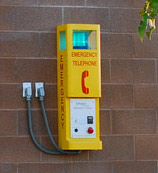 Blue Light Phone locations
Blue Light Phone locations
Our campuses are equipped with emergency telephones so you can easily call for help if you need it. Just locate the emergency telephones topped with a blue light. You can also view a campus map of the emergency phone locations.
In an emergency, press the large red button. It's like dialing '911'
Campus Safety and local area law enforcement will be immediately notified of the emergency and respond. As long as it is safe to do so, please stay by the emergency phone until an officer arrives.
The black button is for non-emergency purposes. It rings directly to the Campus Safety Department. Consider using the emergency phone's black button for issues including: disabled vehicle assistance, unlocking of a classroom, reporting minor injuries, traffic accidents without injuries, lost and found assistance, or if you are lost and in need of directions.
- Risk Management website
- Office of Emergency Management website
- Emergency Response Guide
- Title IX website
- Clery Report
- FAQ Guide on Executive Orders and Federal Compliance
Additional Resources
How is the College Police Department Empowered?
The Yavapai College District Governing Board and the President of Yavapai County Community College, in and by the authority vested in them by the legislature of the State of Arizona, are empowered to organize, provide law enforcement for, and operate a college police agency within Yavapai County Community College District.
Yavapai College Police Officers are state certified and have the same powers as any police officer in the State of Arizona. All police officers in the State of Arizona, including Yavapai College Police Officers, have the authority to enforce laws within the limits imposed by the state and federal constitutions and judicial rulings.
How Do I Make an Official YC Incident Report?
This form is for reporting possible violations of the Student Code of Conduct.
Reports of risk related to individual student(s) behavior and possible threats to campus safety should be reported immediately to law enforcement.
Please visit the “Forms” tab to find the online reporting tool.
If you have any questions about this form, please contact the Director of Residence Life and Judicial Affairs at (928) 776-2207.
What Are the Rules Regarding Parking on Campus?
Parking and vehicular traffic on Yavapai College property shall be maintained and controlled through reasonable and prudent regulations and procedures developed and administered by the President, or his/ her designee.
There is no fee required by students, staff, or visitors to pay for parking on campus.
What Are the Procedures Regarding Explosives, Fireworks, & Weapons?
The use, possession, display, or storage of any weapon, explosive device, or fireworks is strictly prohibited on all land and buildings owned, leased, or under the control of Yavapai College or its affiliated or related entitles, in all residential facilities, in all Yavapai College vehicles, and at all Yavapai College or Yavapai College affiliate-sponsored events and activities, except as provided in A.R.S. § 12-781.
Yavapai College students and employees are required to report violations and suspected violations of this Policy to the Yavapai College Police Department immediately by telephone. If the incident involves an immediate threat to life or property, 911 should be dialed.
The possession of any weapon on any College campus, whether or not concealed, is prohibited without written permission from the Yavapai College Chief of Police.
Where Do I Find Campus Crime Statistics (Clery Report)?
YCPD maintains and publishes statistics related to crimes committed on or near campus per the requirements of the Clery Act. This information includes an Annual Security Report, crime logs, timely warnings, and a compilation of crime statistics.
How Can I Prevent Identity Theft?
Identity fraud can be devastating if you are a victim, but there are ways to prevent identity theft. By taking some simple precautions, you can greatly reduce the likely-hood that your good name and credit will be stolen. Just how do you prevent identity theft from happening to you? Read the following list for some pointers.
- Carry only the identification information and the number of credit and debit cards that you'll actually need.
- Keep your personal information in your home secure, especially if you have roommates, employ outside help or are having service work done in your home.
- Guard your Social Security number. It can be used to open new accounts, credit cards, or even get a job in your name.
- Cancel unused credit card accounts.
- Do not carry your SSN card; leave it in a secure place.
- Ask about information security procedures in your workplace or at businesses, doctor's offices or other institutions that collect personally identifying information from you.
- Order your credit report and monitor it often.
- Remove your name from the marketing lists of the three credit bureaus to reduce the number of pre-approved credit offers you receive.
- Buy a crosscut shredder. Shred all old bank and credit statements and credit card offers before throwing them in the trash.
- Make copies of the contents of your wallet - in case your wallet or purse is stolen.
- Do not leave mail with personal information in your mailbox.
- Never give your credit card number, social security number, or other personal information over the phone unless you trust that individual and/or business.
- Protect your personal information on your computer by installing a firewall and updating your virus protection.
- Do not print your Social Security or Driver's License number on your checks. Carefully examine the charges on your credit card and bank statements.
- Subscribe to an identity theft protection service which will notify you whenever someone tries to assume your identity.
- Place passwords on your credit card, bank, and phone accounts.
- Some of the above content provided courtesy of Identity Theft Prevention Guide.
What Are the Procedures Regarding Campus Drug Use?
It's illegal to use, possess, sell, distribute, make, or transfer narcotics, illegal drugs, and prescription drugs (except as prescribed by your physician). Possessing drug paraphernalia on campus is also prohibited.
How Can I Promote My Personal Safety?
Yavapai College prides itself on having a low crime rate, and one of the ways we keep it low is to encourage you to use common sense and be alert when you are out and about on campus. Reducing the attractiveness of Yavapai College as a target for criminal activity makes the community safer for everyone. Consider following just a few basic safety tips:
- Identify the safest route between your residence hall, parking space, classes and activities.
- Walk with confidence. Let your body language show that you are aware and in control.
- Concentrate on your surroundings, not music or a cell phone call.
- Travel in groups of two or more at night and always walk in well lit, heavily traveled areas.
- Consider carrying a small, readily available, high intensity flashlight.
- Stay on the part of the sidewalk that is farthest from shrubs, dark doorways and alleys.
- Park in an area that will be well lit when you return.
- Check your surroundings before getting out of your vehicle and check the back seat before getting back in. Have your car key in hand and ready to go.
- Know the location of the campus Emergency Telephones.
- Memorize the phone number of the College Police Department (928-776-2185) or 911 from campus phones and add it to your cell phone.
- Don't be afraid to ask for an escort from the College Police Department.
- Carry a whistle. Do not be afraid to scream if you need help.
- Safety first: if you see a weapon, do not resist. Belongings can be replaced.
- When you go out, let someone know where you are going and when you plan to be back.
- Watch out for one another. Go to gatherings with friends, leave with friends.
- Share your class schedule with family and close friends.
- Avoid displaying large amounts of cash or other tempting targets such as jewelry, credit cards, electronics, or expensive clothing.
- Do not leave your belongings unattended, even for a few minutes.
- Always lock your bicycle.
- Photograph and mark your valuables, especially electronics, with invisible ink, and keep track of serial numbers. Engraving your valuables is also recommended.
- Take advantage of services offered by college police, including defense classes tailored to men or women, police escorts and bicycle registration.
- Always have a plan and take ownership of your safety!
How Can I Stay Safe While Living in the Residence Halls?
Your residence hall is your home away from home, and it's important to work with your fellow students to keep it safe.
Residence Hall students are issued keys for their rooms. For personal safety and security of their valuables, students are encouraged to lock their rooms when leaving.
All exterior doors of Residence Halls are locked 24 hours a day. To access the building, you should contact the person you are visiting to let you in.
To further enhance safety, all Residence Hall doors, except the main entrance, are alarmed, alerting staff and the College Police if a door is opened. To enter the building, residents should swipe their ID card at the card readers located by Residence Hall front doors.
Some safety suggestions:
- Carry your student ID and room key with you at all times.
- Lock your door and take your key every time you leave your room.
- Never give your keys or your student ID to anyone, even your best friend.
- Do not prop open any doors in your residence hall.
- Do not let strangers into the hall or into your room.
- Report suspicious people/behavior in the hall immediately to any hall staff member or to the College Police.
- Escort your guests at all times.
- Know the telephone numbers for your resident assistant and hall director.
- Close and lock your windows when you leave your room.
- Do not hide door keys outside.
- Do not leave valuables such as your ID, wallet, purse, music players, laptops or cell phones for all to see.
- Use common sense and take ownership of your safety.
How Can I Prevent Sexual Assault?
It's important to know the facts about date rape and sexual assault so you can avoid becoming a victim.
One of the most important things you need to understand is this: If you are a college-aged woman or man you can be at risk of date or acquaintance rape. Alcohol and/or date-rape drugs are often a factor. So how can you protect yourself?
Visit this link for more information
How Can I Keep My Vehicle Safe?
- Never leave your keys in the car or ignition.
- Always lock your car, even if you will be away for a short period of time.
- Do not leave items of value in plain view, even if the car is locked. Put them in the trunk of your vehicle or take them with you.
- If possible, park in well traveled and well lighted areas.
- Consider installing anti-theft or alarm devices on your vehicle.
Standard Response Protocol Video
Office of Campus Safety
- Prescott Campus
- 1100 E. Sheldon St
- Prescott, AZ 86301
- Building 28
- (928)776-2185 - non-emergency
- (928)237-0420 - emergency
- Verde Valley Campus
- 601 W Black Hills Dr
- Clarkdale, AZ 86324
- Building F
- (928) 634-6599 - non-emergency
- (928)239-0172 - emergency
- campuspolice@yc.edu

